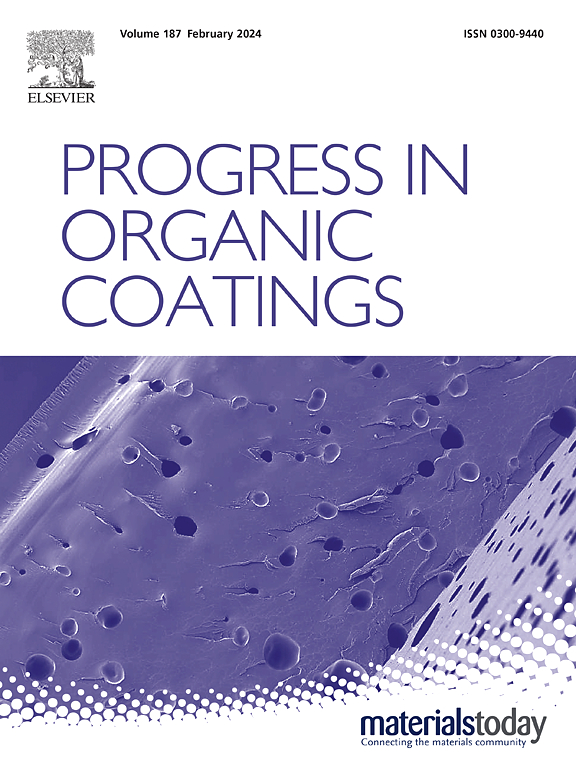Sub-zero temperature self-healing anticorrosion coatings based on dynamic reversible imine and metal coordination bonds
IF 7.3
2区 材料科学
Q1 CHEMISTRY, APPLIED
引用次数: 0
Abstract
Anticorrosive coatings have been widely studied as a promising strategy to prevent or delay metal corrosion, but their effectiveness is limited by coating degradation. Self-healing coatings can mitigate damage through autonomous repair, thereby significantly extending service lifetime even under harsh conditions. Herein, we report an innovative self-healing anticorrosion coating system based on a novel dual-dynamic-bond network combining reversible imine and Zn2+ coordination bonds. The designed PDMS-HQA-Znₓ system achieve breakthrough autonomous self-healing at sub-zero temperatures (−10 °C) without external stimuli, while maintaining excellent mechanical properties (0.11 MPa tensile strength, 131 % strain). The unique metal-ligand coordination architecture enables: (1) temperature-independent self-healing through dynamic bond recombination, (2) tunable mechanical performance via Zn2+ content adjustment, and (3) excellent corrosion protection with low corrosion current density (7.6 × 10−6 A·cm−2 after 72 h in 3.5 wt. % NaCl). This work establishes a new design principle for next-generation protective coatings that maintain functionality under extreme conditions.
基于动态可逆亚胺和金属配位键的低温自愈防腐涂料
防腐涂层作为一种很有前途的防止或延缓金属腐蚀的策略而受到广泛的研究,但其有效性受到涂层降解的限制。自修复涂层可以通过自动修复来减轻损伤,因此即使在恶劣条件下也可以显着延长使用寿命。在此,我们报告了一种创新的自修复防腐涂层体系,该体系基于一种新的双动态键网络,结合可逆亚胺和Zn2+配位键。设计的PDMS-HQA-Znₓ系统在零下(- 10°C)温度下无需外界刺激即可实现突破性的自主自修复,同时保持优异的力学性能(抗拉强度0.11 MPa,应变131%)。独特的金属配体配位结构能够:(1)通过动态键重组实现不受温度影响的自修复,(2)通过调整Zn2+含量实现可调的机械性能,以及(3)具有低腐蚀电流密度(在3.5 wt. % NaCl中72小时后为7.6 × 10−6 A·cm−2)的优异防腐蚀性能。这项工作为下一代保护涂层在极端条件下保持功能建立了新的设计原则。
本文章由计算机程序翻译,如有差异,请以英文原文为准。
求助全文
约1分钟内获得全文
求助全文
来源期刊

Progress in Organic Coatings
工程技术-材料科学:膜
CiteScore
11.40
自引率
15.20%
发文量
577
审稿时长
48 days
期刊介绍:
The aim of this international journal is to analyse and publicise the progress and current state of knowledge in the field of organic coatings and related materials. The Editors and the Editorial Board members will solicit both review and research papers from academic and industrial scientists who are actively engaged in research and development or, in the case of review papers, have extensive experience in the subject to be reviewed. Unsolicited manuscripts will be accepted if they meet the journal''s requirements. The journal publishes papers dealing with such subjects as:
• Chemical, physical and technological properties of organic coatings and related materials
• Problems and methods of preparation, manufacture and application of these materials
• Performance, testing and analysis.
 求助内容:
求助内容: 应助结果提醒方式:
应助结果提醒方式:


